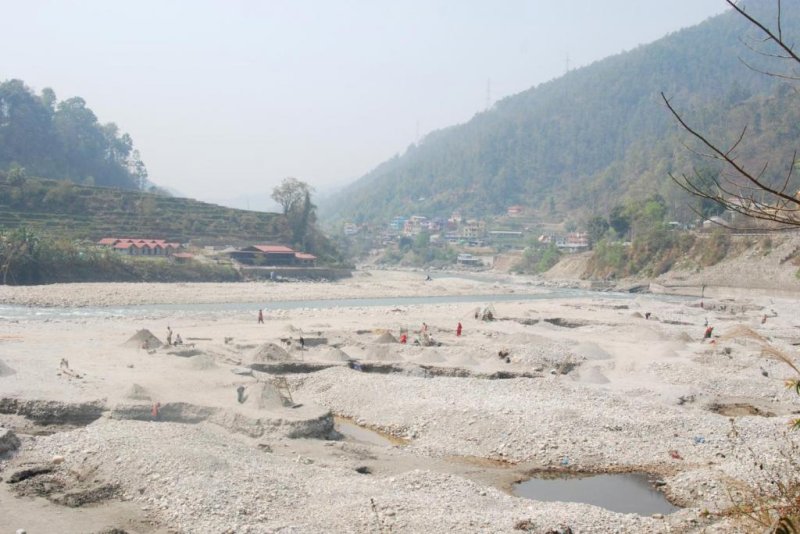Jewish-Arab ties in region hang in balance after Hamas-Israel heaviest fighting since 2014
(
Xinhua) PEOPLES DAILY
, May 24, 2021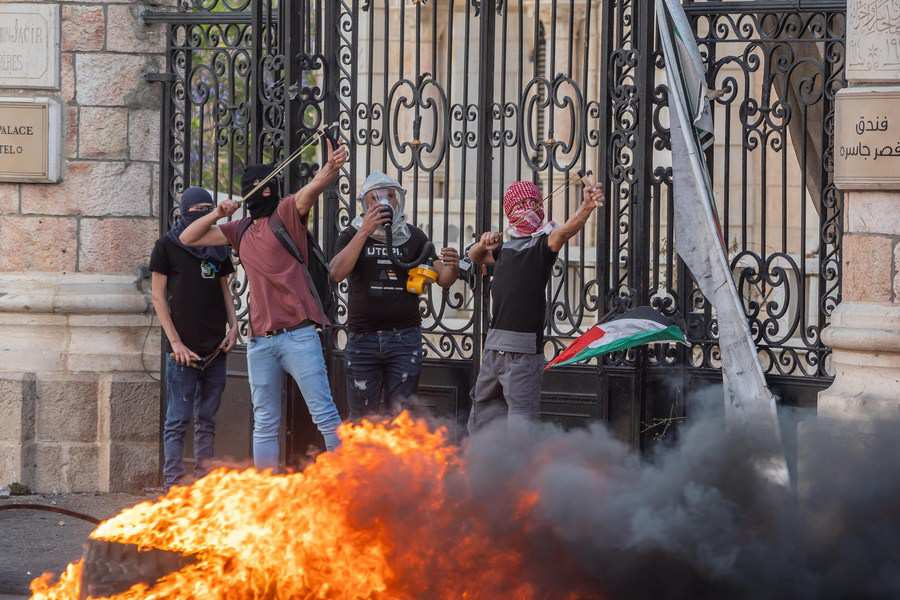
Palestinian protesters use slingshots to hurl stones at Israeli security members during a protest against the continued Israeli air strikes on the Gaza Strip, in the West Bank city of Bethlehem, on May 20, 2021. (Photo by Luay Sababa/Xinhua)
After 11-day-long war between Israel and Gaza that only ended last Friday, tension between Arabs and Jews in the region that grew dramatically during the war can still be felt, leaving a big question mark over the future of their relations.
JERUSALEM, May 23 (Xinhua) -- Despite the cease-fire reached between Gaza's ruler Hamas and Israel for a round of their probably heaviest fighting since 2014, the tension between Arabs and Jews in the region that grew dramatically during the fighting can still be felt, leaving a big question mark over the future of their relations.
In Israel, there are many mixed cities of Jewish and Arab residents. The 11-day-long war between Israel and Gaza that only ended last Friday pushed the underlying turmoil in the region to a climax.
The trigger for this round of fighting, as most previous cases, was from the Old City of Jerusalem. The Palestinians accused Israel of restricting movement in and around Al-Aqsa Mosque in the Old City, after the Israeli police took a rare step of blocking buses of Arab worshippers heading to the mosque on the holiest night of the Ramadan month.
"Al-Aqsa is a red line. It is a consensus among Arabs. It is explosive and the issue needs to be handled properly," said Afif Abu Much, a political analyst and contributor to the U.S.-based Al-Monitor news website that reports and analyses developments of the Middle East.
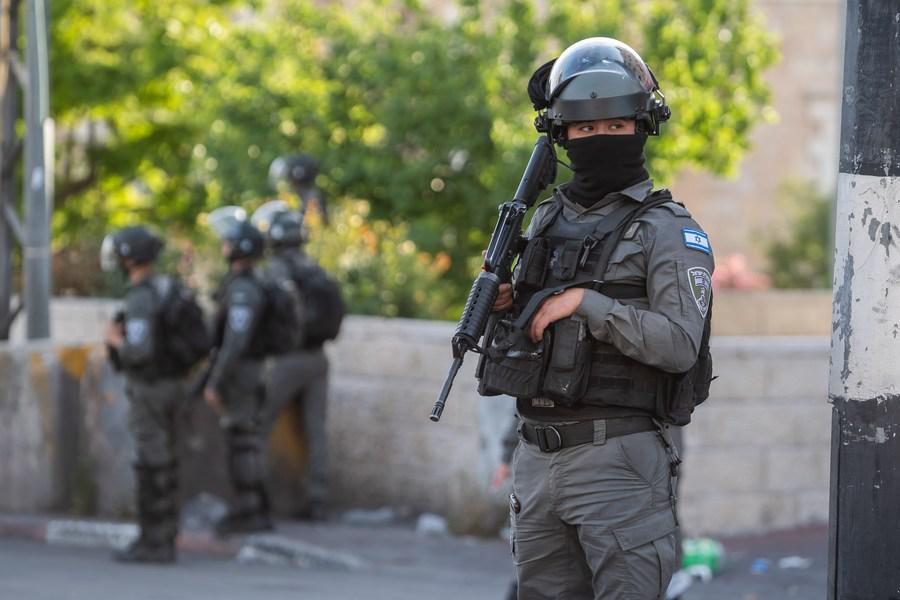 Israeli border police(WO)men are positioned during a protest against the continued Israeli air strikes on the Gaza Strip, in the West Bank city of Bethlehem, on May 20, 2021. (Photo by Luay Sababa/Xinhua)
Israeli border police(WO)men are positioned during a protest against the continued Israeli air strikes on the Gaza Strip, in the West Bank city of Bethlehem, on May 20, 2021. (Photo by Luay Sababa/Xinhua)
In addition, Arabs protested what they said was illegal eviction of Palestinian residents from an East Jerusalem neighborhood to make room for Jewish settlers. Clashes with police erupted throughout Jerusalem and quickly spread to other places in the region.
In the mixed Israeli city of Lod, an Arab man was shot dead by Jews who claimed they were acting in self-defense, while a Jewish man was killed by rocks thrown at his car. Scenes of lynches being committed by both Jews and Arabs were seen across the country.
According to the Israeli police' foreign media spokesman Micky Rosenfeld, 280 policemen were injured in nationwide violence, while more than 1,000 suspected of being involved in the unrest were arrested.
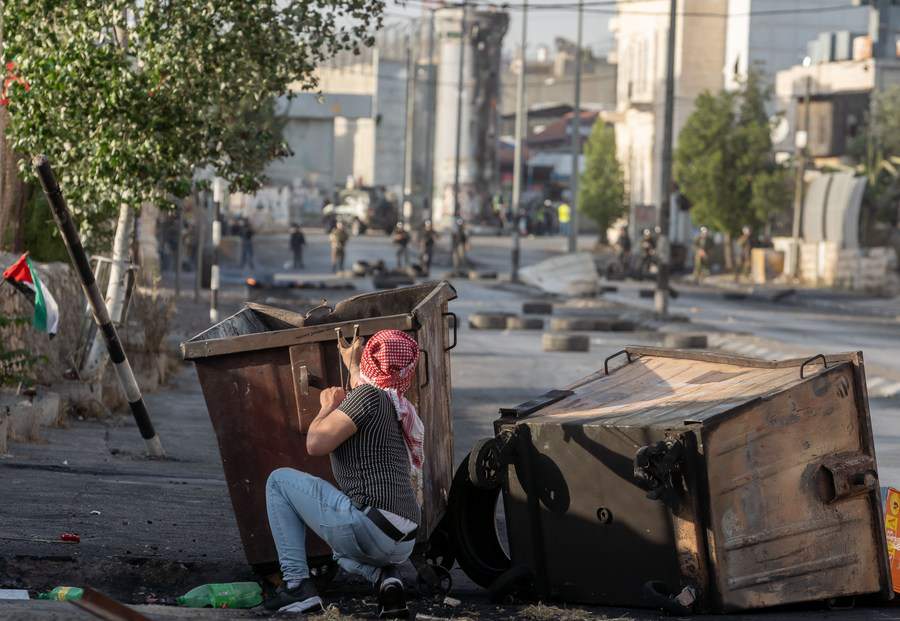
THE WEAPON OF DAVID AGAINST THE ISRAEL MILITARY GOLIATH
A Palestinian protester uses a slingshot to hurl a stone at Israeli security members during a protest against the continued Israeli air strikes on the Gaza Strip, in the West Bank city of Bethlehem, on May 20, 2021. (Photo by Luay Sababa/Xinhua)
"There is intense bitterness which blew up this time," said Thabet Abu Rass, co-director of the Abraham Initiatives, a non-governmental organization that promotes Jewish-Arab co-existence. "The combination of the issues together with the ethnic, religious and identity crisis (makes) Arabs feel humiliated."
As a whole, Arab residents in Israel have a lower participation rate in the workforce and lower salaries than Jewish Israelis. Many of the mixed cities are undergoing a gentrification trend, in which the real estate prices have risen and made home ownership for Arabs unattainable. The predominantly Jewish cities are even more expensive and often not welcoming to Arabs.
In addition, the rate of crime and violence in the Arab society is significantly higher than that in Jewish society. Years of empty promises to tackle the problem have resulted in pent-up frustration and ethnic undertones that have the potential of spiralling into a violent internal conflict.
Worse still, the Israeli parliament passed the Jewish-Nation State law in 2018, which essentially downgrades the status of the Arabs that make up 20 percent of the population in the country. Many believe the law was a turning point in the already tense relations between Arabs and Jews.
"Israel has still not come to terms with the fact that it has Arab citizens," said the political analyst Abu Much. "We still see Jewish paternalism and supremacy. This makes the Arabs feel like they are outsiders."
Israeli security members are positioned during a protest against the continued Israeli air strikes on the Gaza Strip, in the West Bank city of Bethlehem, on May 20, 2021. (Photo by Luay Sababa/Xinhua)
"The disparity, the uneven development and radical and racist statements ... the years of neglect of civilian projects and development, policies of discrimination ... led to the explosion. If these things will not be taken care of now ... we will witness another outbreak in the coming years," Abu Rass noted.
After what has occurred recently, the possibility of an Arab party joining a government likely to be formed in Israel in the coming weeks may have been ruled out, representing yet another setback for Arab-Jewish relations.
"It is unacceptable that Arabs are not part of the political game," said Abu Rass. "We need to think about how to incorporate them in the decision-making process to promote a sense of belonging and a sense of ownership."
(Web editor: Meng Bin, Liang Jun)







 Israeli border police(WO)men are positioned during a protest against the continued Israeli air strikes on the Gaza Strip, in the West Bank city of Bethlehem, on May 20, 2021. (Photo by Luay Sababa/Xinhua)
Israeli border police(WO)men are positioned during a protest against the continued Israeli air strikes on the Gaza Strip, in the West Bank city of Bethlehem, on May 20, 2021. (Photo by Luay Sababa/Xinhua)



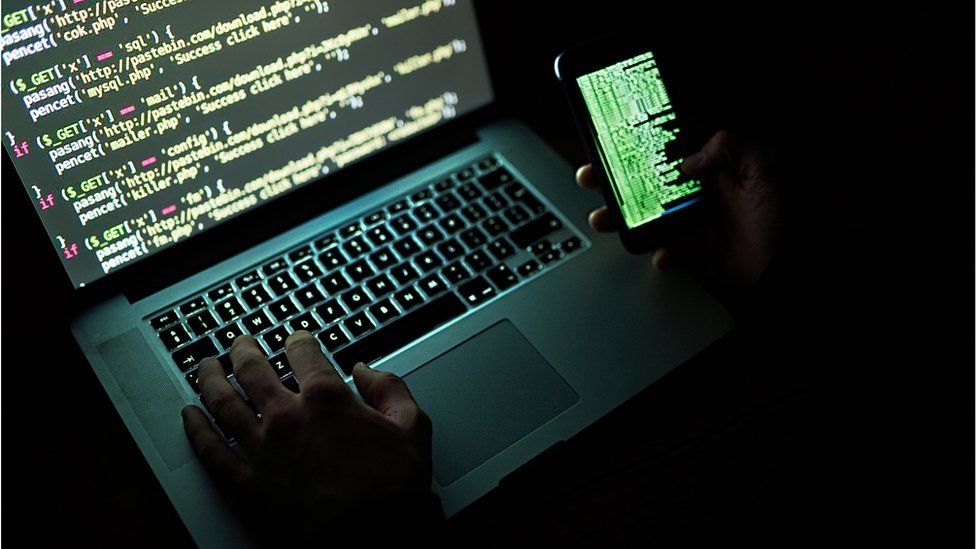
 IMAGE COPYRIGHTGETTY IMAGESimage captionIreland's Department of Health and the Health Service Executive were both targeted by hackers
IMAGE COPYRIGHTGETTY IMAGESimage captionIreland's Department of Health and the Health Service Executive were both targeted by hackers
 Katja Knupper/Die Fotowerft/DeFodi Images via Getty Images
Katja Knupper/Die Fotowerft/DeFodi Images via Getty Images/cdn.vox-cdn.com/uploads/chorus_image/image/69330458/acastro_200428_1777_coronavirus_0002.0.0.jpg)
